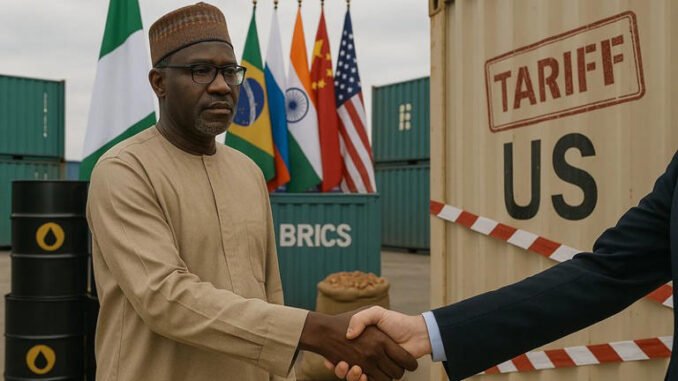Brazil and China recorded $245 million and $200 million respectively, while Egypt, a new entrant to the bloc, accounted for $1. 06 million.
The total trade value is expected to be higher when factoring in exchanges with other BRICS members such as Russia, Iran, Ethiopia, and the UAE, whose figures were not included in the current data.
US Tariff Threats Raise Concerns Exports to the United States rose 65. 5% quarter-on-quarter, driven largely by oil, agro-based, and petrochemical products.
However, Washington’s consideration of a new 10% tariff on imports from countries seen as aligning with BRICS could put that growth at risk.
Former US President Donald Trump, campaigning ahead of the 2026 midterm elections, accused BRICS nations of “undermining American interests” through de-dollarisation and anti-hegemonic policies.
He proposed tariff increases that could push Nigeria’s average exposure on US exports from 14% to 24%.
Trade experts warn that such measures would undermine Nigeria’s competitiveness, especially in key export sectors.
Given Nigeria’s dependence on export earnings to support the naira, a decline in US trade could force the Central Bank to intervene, draining reserves at a time of persistent inflation and tight monetary policy.
Dr Femi Egbesola, President of the Association of Small Business Owners of Nigeria, cautioned that escalating trade tensions could hurt Nigeria’s manufacturing sector, which relies heavily on imported machinery and raw materials.
Higher costs from countries targeted by the US tariffs—such as the US, South Korea, and Japan—could reduce productivity and worsen the trade deficit.
Strategic Non-Alignment and Growing South-South Links Nigeria has maintained an official non-aligned stance.
Ademola Oshodi, senior aide to the President on foreign affairs, said Nigeria is a BRICS+ partner rather than a full member, describing the bloc as a “practical platform for strategic South-South cooperation. ” He stressed that Nigeria remains engaged with Western organisations including the Commonwealth, EU, and G20.
Nonetheless, economic ties with BRICS members are strengthening.
President Bola Tinubu’s rapport with Brazilian President Lula da Silva has advanced energy cooperation, while exports to India have doubled in the past six months.
China, meanwhile, has ramped up investments in Nigerian infrastructure, notably the Lekki deep-sea port and northern railway expansions.
Egbesola believes BRICS’ deepening engagement with Africa presents Nigeria with an opportunity to position itself as a continental trade hub under the African Continental Free Trade Area (AfCFTA).
With its vast consumer market, strategic location, and growing logistics capacity, Nigeria could become a gateway for BRICS investments targeting Africa’s rising middle class.
Analysts suggest Nigeria must boost trade infrastructure, cut non-tariff barriers, and align its regulatory environment with AfCFTA goals.
Strengthening domestic industries to compete on the global stage will be key to sustaining its trade momentum amid shifting geopolitical dynamics.
Approximate exchange rate of ₦1,500 = $1 USD.
All Zim News
All Zim News is a central hub for all things Zimbabwean, curating news from across the country so no story is missed.
Alongside aggregation, our team of nationwide reporters provides real-time, on-the-ground coverage.
Stay informed and connected — reach us at admin@allzimnews. com. 🔗 Read Full Article
All Zim News is a central hub for all things Zimbabwean, curating news from across the country so no story is missed.
Stay informed and connected — reach us at admin@allzimnews. com.
